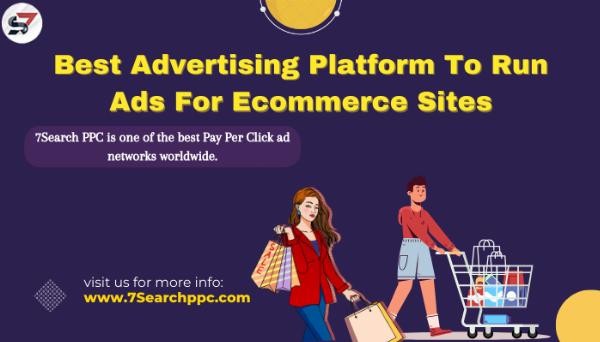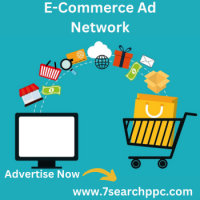Best Advertising Platform To Run Ads For Ecommerce Sites

Strong8k brings an ultra-HD IPTV experience to your living room and your pocket.
In the ever-evolving world of ecommerce, advertising is the lifeblood of success. To stand out in a crowded digital marketplace, you need to reach the right audience at the right time. That's where advertising platforms come into play. But with numerous options available, which one should you choose for your ecommerce site? In this comprehensive guide, we'll explore the best advertising platforms for ecommerce sites, weighing the pros and cons of each to help you make an informed decision.
Advertising Platforms:
Google Ads
Google Ads, formerly known as Google AdWords, is the undisputed giant of online advertising. It offers a massive reach, putting your ads in front of billions of users worldwide through Google's search engine, YouTube, and partner websites. Here are some key advantages:
High Intent Traffic: Google's search ads target users actively seeking information or products, making it ideal for ecommerce sites.
Flexible Budgeting: You can set daily budgets and control costs effectively.
Keyword Targeting: Precise keyword targeting ensures your ads are shown to the right audience.
However, competition can drive up costs, and managing Google Ads campaigns can be complex for beginners.
Facebook Ads
Facebook Ads is another heavyweight in the advertising arena, offering extensive audience targeting options on both Facebook and Instagram. Here's why it's a top choice for ecommerce:
Granular Targeting: You can reach users based on demographics, interests, behaviors, and more.
Visual Appeal: Ideal for showcasing products through image and video ads.
Remarketing: Re-engage past website visitors with tailored ads.
The main drawback is that Facebook's algorithm changes can impact ad performance, and ad fatigue can occur when targeting the same audience repeatedly.
Instagram Ads
Instagram, owned by Facebook, deserves special mention due to its visual nature and popularity among younger demographics. If your ecommerce business targets a younger audience, Instagram Ads can be highly effective:
Visual Storytelling: Perfect for showcasing your products through visually appealing content.
Engagement: High engagement rates, especially for lifestyle and fashion brands.
Integration with Facebook: Easily manage both platforms through the Facebook Ads Manager.
The downside is that competition on Instagram is fierce, and the platform is primarily designed for mobile users.
7Search PPC
7Search PPC is a prominent advertising network for ecommerce businesses. They have a number of ad types available, including video, display, and native advertisements. 7Search PPC also places a major emphasis on targeting, allowing businesses to reach their desired audience with their adverts.
7Search PPC is the ideal advertising and monetization platform for e-commerce sites since it provides advertisers with a wide range of features and ad kinds to help them efficiently reach their objectives. Furthermore, 7Search PPC provides online store owners with an excellent chance to monetize their websites and generate a consistent stream of revenue. 7Search PPC's extensive network and devotion to genuine traffic help both publishers and advertisers.
Amazon Advertising
For ecommerce businesses selling products on Amazon, Amazon Advertising is a must-consider option:
Buyer Intent: Reach users who are actively searching for products on the Amazon platform.
Product Display Ads: Showcase your products on competitor product pages.
Sponsored Brands: Promote your brand and product listings.
However, advertising on Amazon can be costly, and competition among sellers is intense.
Pinterest Ads
Pinterest is a visual discovery platform with a dedicated user base interested in finding new ideas and products. It's a unique platform for ecommerce advertisers:
Visual Inspiration: Ideal for brands with visually appealing products.
Shopping Features: Users can purchase products directly through the platform.
Longevity: Pins have a longer shelf life compared to other social media posts.
The challenge lies in understanding and catering to Pinterest's specific user base and visual content requirements.
Snapchat Ads
If your target audience includes younger demographics, Snapchat can be an effective advertising platform:
Engagement: High engagement rates among younger users.
Snapchat Discover: Showcase your products through curated content.
Augmented Reality (AR) Ads: Interactive ad formats for a unique user experience.
The limitation is its relatively smaller user base compared to giants like Facebook and Google.
YouTube Ads
YouTube is the second-largest search engine globally and a prime platform for video advertising:
Video Content: Engage users through video ads, tutorials, and product showcases.
YouTube Search Ads: Target users searching for specific keywords.
In-Stream Ads: Play your ads before or during popular videos.
The challenge is creating compelling video content and managing ad campaigns effectively.
TikTok Ads
TikTok has taken the world by storm with its short-form video content, making it an intriguing option for ecommerce brands:
Viral Potential: Create catchy, shareable content to reach a wide audience.
Younger Demographics: Ideal for brands targeting Gen Z and younger Millennials.
Branded Hashtag Challenges: Encourage user-generated content.
TikTok's advertising platform is relatively new, and competition is increasing rapidly.
LinkedIn Ads
If your ecommerce business operates in the B2B space or targets professionals, LinkedIn Ads can be a valuable choice:
B2B Targeting: Reach decision-makers and professionals in specific industries.
Lead Generation: Use lead generation forms to collect valuable customer information.
Sponsored Content: Promote your products or services directly on users' feeds.
However, LinkedIn Ads tend to have a higher cost per click (CPC) compared to other platforms.
Conclusion
Choosing the best advertising platform for your ecommerce site is a crucial decision that can significantly impact your business's success. Each platform comes with its unique advantages and challenges, and the right choice depends on your target audience, budget, and advertising goals.
To make an informed decision, consider conducting small-scale experiments on multiple platforms to gauge their effectiveness for your specific business. Additionally, stay up-to-date with industry trends and algorithm changes to adapt your advertising strategies accordingly.
In the end, the best advertising platform for your ecommerce site may involve a combination of several platforms to maximize your reach and achieve your marketing objectives. Regardless of your choice, remember that effective advertising requires constant monitoring, optimization, and a deep understanding of your audience's preferences and behaviors.
Note: IndiBlogHub features both user-submitted and editorial content. We do not verify third-party contributions. Read our Disclaimer and Privacy Policyfor details.



